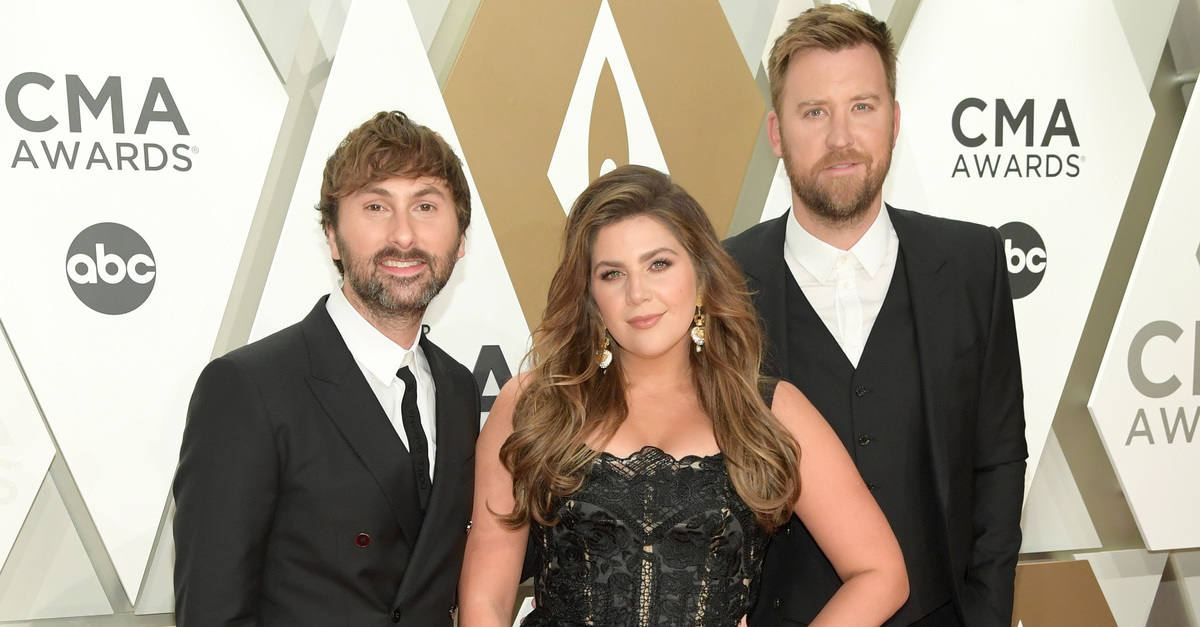
Dave Haywood, Hillary Scott and Charles Kelley of Lady Antebell—err, Lady A—attend the 53rd annual CMA Awards at the Music City Center on November 13, 2019 in Nashville, Tennessee.
You had to know that the country music version of #BlackLivesMatter wasn’t going get the melody exactly right. The short, but totally predictable story: country trio attempts wokeness, ends up infuriating Black community.
Here’s what happened. Following George Floyd’s death and nationwide protests, the group “Lady Antebellum” suddenly realized their name maybe wasn’t the best idea. So, on June 11, the band posted on Instagram that their “hearts have been stirred with conviction,” about the “injustices, inequality and biases Black women and men have always faced and continue to face everyday.” As a result of their newfound awakening, along with “much personal reflection, band discussion, prayer and many honest conversations with some of our closest Black friends and colleagues,” the band decided to drop “Antebellum” from its name. Forevermore, the group would now be officially known as “Lady A”—a name that fans of the band had long used anyway.
https://www.instagram.com/p/CBTJB4Dg3WM/?utm_source=ig_web_copy_link
Lady A’s racial sensitivity, though, appears to have had the shelf life of a buttered biscuit. A few short weeks later, the group filed a federal lawsuit against Black blues singer Anita White – who had already been going by the name “Lady A” for many years—two decades, even. The would-be ex-Antebellum (Postbellum?) plaintiffs already registered the trademark “Lady A,” and apparently, they thought now would be a fabulous time to enforce those rights in court.
The suit, filed July 8 in Nashville’s U.S. District Court for the Middle District of Tennessee, tells the story of the country trio’s legal claim:
..in recognition of the hurtful connotations of the word “antebellum,” the Musical Group announced on June 11, 2020 that they would discontinue using their “Lady Antebellum” brand and use only the federally-registered “Lady A” brand moving forward. Notably, the Musical Group started using “Lady A” as a source indicator for their goods and services as early as 2006-2007, adopting as an official brand a name their fans began associating with the Musical Group as they rose to popularity. The Musical Group has used “Lady A” interchangeably with “Lady Antebellum” since the 2006-2007 timeframe.
The group now seeks a declaratory judgment that the name “Lady A” belongs solely to them – and not to Anita White.
In the complaint, the trio of plaintiffs argued that they’d secured the trademark first, and that they were using the name Lady A to far more success than Anita White. The former “Antebellums” called themselves, “one of the twentyfirst century’s premier vocal groups, blending deeply-felt emotions with classic Country sounds,” which has amassed record-breaking success, ushering in ten No. 1 hits with more than 18 million album units, 34 million tracks sold, and nearly five billion digital streams.” The Complaint went on to list awards and accolades bestowed on the group.
By contrast, the trio claimed to have only “recently learned” about the very existence of blues, soul, and funk artist Anita White – who only performs in just a handful of states, and only has 166 monthly listeners on Spotify.
According to the lawsuit, the group and White tried to discuss some sort of cooperation on the name –even exploring co-writing some music. Discussions broke down, though, and White demanded $10 million from the band. The plan, according to White, was to use that money to rebrand herself and mitigate the effects of Lady Antebellum’s name-switch.
The musical group now argues that they’ve been using “Lady A” for years, and because White never objected, they should have the sole legal right to use the name.
While the band may have a solid case under trademark law, public response to the lawsuit has been anything but good. Many are slamming the country trio for using their status and success to bully a Black artist. The move to sue White, particularly in the context of the professional music world, is striking many as tone-deaf.
Woke whites change their band name and now sue a black woman who used same name for decades before them. https://t.co/uW2I2PCNZT
— Cernovich (@Cernovich) July 8, 2020
Their statement is bullshit. The fact Anita White is less famous makes her susceptible to high levels of corporate bullying/legal tactics. They saw someone else using the name they wanted, realized she wasn’t as famous, and figured she wouldn’t put up a fight.
She is. Pay her. https://t.co/q7s3OrcX2H— Brian W. Foster (@BrianWFoster) July 9, 2020
BREAKING: Country trio you don’t like gives you another reason not to like them.
— debatethonty metano (@theneedledrop) July 8, 2020
Wait, so after realizing (way late) that Antebellum might be problematic. They’re colonizing a name #AnitaWhite has used for YEARS because they want it for themselves now?!
Nope. This is NOT how ya do allyship.
I need someone to explain this to me & their foolishness to them. https://t.co/N44SWA1EVN
— yvette nicole brown (@YNB) July 9, 2020
You can read a copy of the lawsuit for yourself below:
Formerly Known as Lady Antebellum Complaint by Law&Crime on Scribd
[Photo by Jason Kempin/Getty Images]
Have a tip we should know? [email protected]